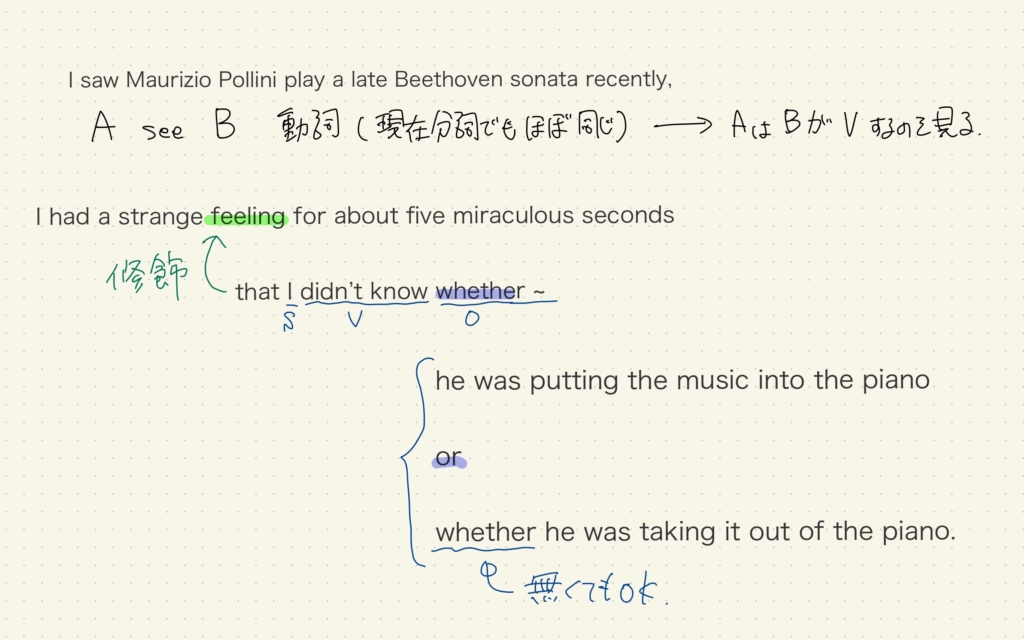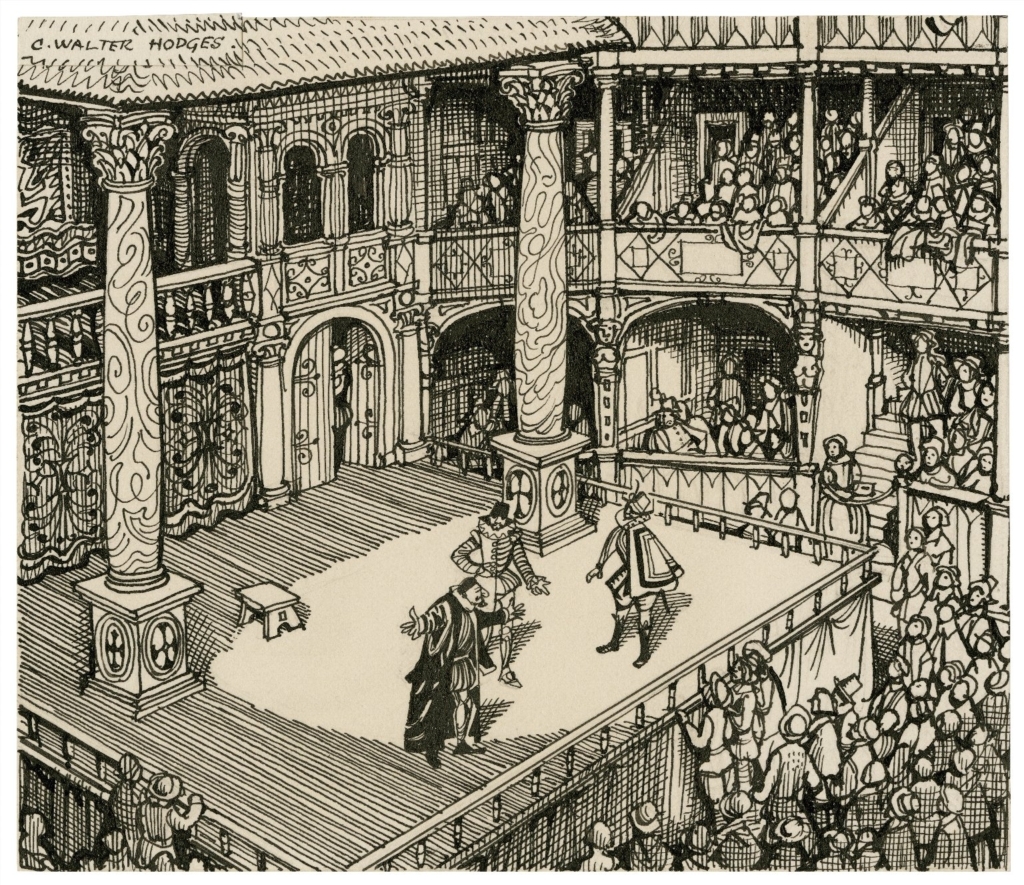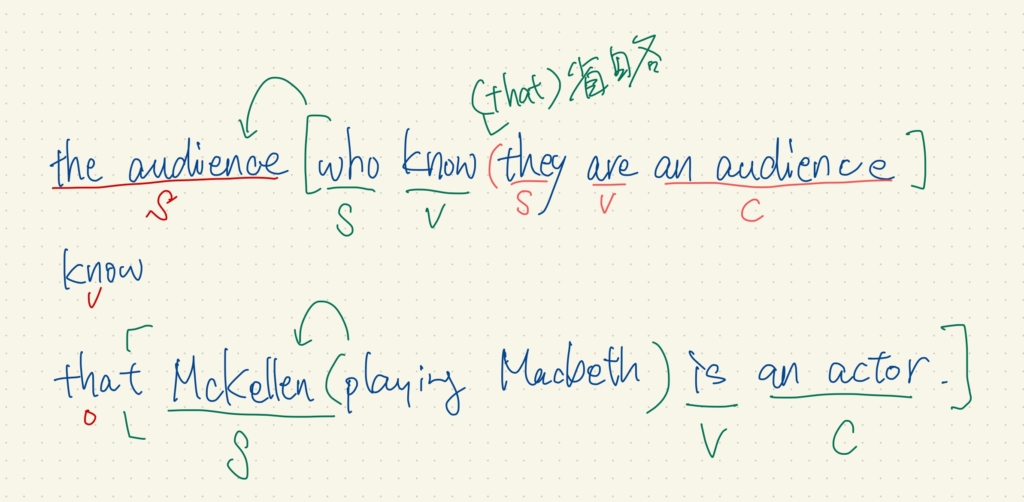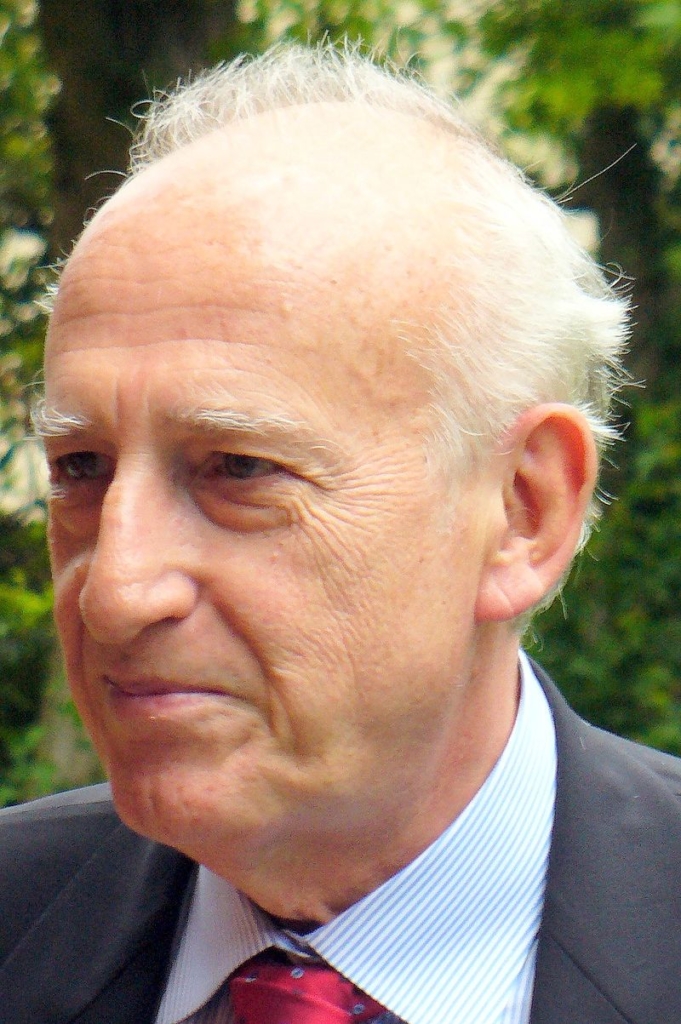解説動画
この記事は、以下の解説動画の中で利用しているものです。
- 【シェイクスピア】『マクベス』。偉大な俳優による解釈・英語解説【イアン・マッケラン】
- 【マクベス解釈 #2】イアン・マッケランによるシェイクスピア演劇論【英語】
- #3/3 マクベス独白の英詩、イメージ、意味、演じ方 by イアン・マッケラン
単語と言い回し
- sense / sens /
-
感覚(機能)、(漠然とした)感じ、気持ち、感じ、意識、(美・方向などに対する本能的な)センス、勘、判断能力、(知的・道徳的な)感覚、観念
- miraculous / mɜ:ˈækjʌlʌs /
-
奇跡的な、不思議な
- playwright / ˈpleɪˌraɪt /
-
脚本家、劇作家
- simultaneously / sɪməlˈteɪnɪəsli/
-
同時に
- soliloquy / sʌˈlɪlʌkwi: /
-
独白
- crudely / ˈkru:dli: /
-
天然のままで、粗野に、下品に、露骨に
- finite / fάɪnɑɪt(米国英語) /
-
限定されている、有限の、定形の
-
Infinite (無限の、無量の、無数の、莫大な、果てしない、不定形の) の逆
- You’ve got to do many more things
-
あなたは、より多くのことをする必要がある。
to have got to do で「しなければならない」の意味になる。"I've got to go." で「もう行かないと」となるのがよく見る例。
- metaphors / ˈmetʌfɔ:rz /
-
隠喩。
直喩は、simile / sím(ə)li /
- timbre / ˈtɪmbɜ: /
-
音色、音質
- eyelids / άɪlìd(米国英語) /
-
まぶた
- make up / meɪk ʌp /
-
(7) 〈話・口実などを〉うまくごまかして作る, でっちあげる; 〈物語などを〉作る.
- line / lάɪn(米国英語) /
-
(詩の) 1 行
- blank verse
-
無韻詩
- imagery / ˈɪmʌdʒri:(英国英語) /
-
像、彫像、心像、(比喩的表現に用いる)形象、イメージ
- literary / lítərəri /
-
文学の、文学的な、文筆の、文芸の、文学に通じた、著述を業とする、文語の、文語的な
- device / dɪvάɪs(米国英語) /
-
装置、考案物、からくり、爆破装置、爆弾、工夫、方策、趣向、修辞的技巧、比喩表現
- rather / rάːðə /
-
むしろ、むしろ喜んで、進んで、いっそ…したほうがよい、いいのだが、どちらかといえば、いやむしろ、幾分、少々、やや
- trip / tríp(米国英語) /
-
旅行、(用向きの)外出、ひと走り、通勤、往復、踏みはずし、つまずき、つまずかせること、過失、言いそこない
-
Trip has several different meanings. I believe he is using it here as '(of words) flow lightly and easily.' I believe this based on how he speaks the line 'There would have been a time for such a word' very choppy
- lane / leɪn /
-
(生け垣・家などにはさまれた)小道、路地、細道、(狭い通りの)横町、(道路の)車線、レーン、(汽船・飛行機などの)規定航路、(プール・トラックの)コース
- pun / pˈʌn(米国英語) /
-
(同音意義語を利用した)だじゃれ、地口、ごろ合わせ
- gust / gˈʌst(米国英語) /
-
突風、一陣の風、にわか雨、どっと噴出する煙、どっと燃え上がる火炎、噴出、ほとばしり、激発
- meager / míːgə /
-
貧弱な、乏しい、不十分な、豊かでない、やせ(衰え)た
- mean / mi:n /
-
(形容詞)見劣りする
- dilemma / dɪˈlemʌ /
-
(好ましくない二者択一を迫られる)板ばさみ、窮地、ジレンマ、両刀論法
- Cambyses
-
ここでは、紀元前6世紀のアケメネス朝ペルシアの第二代目の王カンビュセス2世のこと(多分)(藤子・F・不二雄のSF好きの方への参考。Ian McKellenも、カンビュセス2世の命で砂漠を歩き、砂に埋められた5万人の兵士の伝説のことに言及しているのかもしれない)。
- pentameter / penˈtæmɪtər /
-
a line in poetry which has five stressed syllables; the rhythm of poetry with five stressed syllables in a line:
Most of Shakespeare's verse is written in iambic pentameter (= five pairs of syllables with an unstressed syllable followed by a stressed syllable). - oblivion / əˈblɪviən /
-
忘却、無意識状態
全文と翻訳
シェイクスピアの演劇を演じるために必要なこと
If this workshop’s done anything I hope it's got the, in my view, wrong belief that so Shakespeare's verses, music, and all you have to find out is the tune, and everything will be alright. Rather, I believe that if you look after the sense the sound will look after themselves.
翻訳
このワークショップが何かしらの役にたったのであるとしたら、願わくば、私の視点からは、間違っている考えを捉えられていればと思います。つまり、シェイクスピアの詩、音楽において、はっきりさせなければいけないのは音の調子であって、それが分かればすべてが完成するという考えについて。私はむしろ、意味を理解することで、音はおのずから決まってくるということです。
ポイント
tune: 曲のことでもあるけど、チューニング(音を合わせること)や、ラジオのチャンネル(波長)を合わせる(stay tuned!とか)、などでも使われる。
look after themselves: 自分自身の面倒を見る。ここでは、「音は、自分自身の面倒を見る」ということで、人間がなにか決めていかなくても、意味から自動的に導かれるという意味。
聞き取りは、ネイティブにとってもはっきりしないそうです。
I saw Maurizio Pollini play a late Beethoven sonata recently, and I had a strange feeling for about five miraculous seconds that I didn't know whether he was putting the music into the piano or whether he was taking it out of the piano.
翻訳
最近、Maurizio Pollini がベートーヴェンの後期のソナタを演奏しているのを見たのですが、おかしな感覚を、不思議なおよそ5秒間感じたのですが、それは彼がピアノに音楽を入れているのか、ピアノから音楽を取り出していたのかが、分からなくなったというものです。
構文

Maurizio Pollini
And acting, at its best, Shakespeare, I think, is, of that nature, that the actor is the playwright and the character simultaneously.
翻訳
シェイクスピアを演じること、それが最高の状態であるのは、私が思うに、その性質から見て、俳優が、同時に劇作家であり登場人物であることです。
分かりやすくした書き換え
書き換えたあとの翻訳
私が思うに、シェイクスピアの演劇というのは、俳優がある瞬間に、劇作家であり、かつ、登場人物である場合に、もっとも価値が高くなり面白くなります。なぜなら、それが彼の作劇術の性質だからです。
意訳
シェイクスピアによって書かれた演劇がもっとも価値を発揮するためには、俳優は作家として、また、登場人物として、同時に存在し演じることが必要になります。
This can only be achieved by the actor having total awareness of all the complexities of Shakespeare.
翻訳
これが達成できるのは、俳優がシェイクスピア(演劇)の複雑性について完全に理解しているときのみです。
So if we were to take a speech like Macbeth's last soliloquy, tomorrow and tomorrow and tomorrow, which to crudely summarize as a description of total blackness, total despair that life is finite, it isn't enough just to say that and put that quality of despair into the voice and just hope it and just follow the rhythms.
翻訳
つまり、マクベスの最後の独白、tomorrow and tomorrow and tomorrow、という生は永遠ではないという完全な暗黒、絶望の叙述として、露骨に要約してしまうものを読むときには、独白をただ発話し、絶望感を声に乗せて、それで大丈夫だと期待して、リズムに沿う、というだけでは不十分なのです。
ポイント
- 長い if 節
- which 句の修飾の関係(soliloquy, which ~)
- it isn't enough just to V の形
意訳
つまり、マクベスの最後の独白という、人生は儚いという絶望について語るものを演じるときには、その絶望感を声に乗せてリズムに従ってそのセリフを言えば済むわけではありません。
You've got to do many more things as well. You have to think and have analyzed in rehearsal totally, so that your imagination of being fed by the concrete metaphors, concrete images, pictures, can then feed through into the body, into gesture, into timbre voice, into eyelids, into every part of the actor’s makeup, so that it does seem, as I've just said, that he is making it up as he goes along although that the actor, of course, knows that he isn’t.
翻訳
もっと多くのことをしなければならないのです。思考しなければならないし、リハーサルで完璧に分析を行っておく必要があります。そうすることで、ひとつひとつの暗喩や具体的なイメージ、心像によって得られたイマジネーションを、今度は、身体、ジェスチャー、声質、まぶた、俳優のすべての演技に落とし込むことができ、結果として、私がこれまで述べてきたように、俳優がその場で体験をしているかのように見えるのです。もちろん、俳優はそんなことはない、と知っているのだけれども。
ポイント
- think (現在) と have analyzed (過去) が両方とも You have to を受けていること
- fed の使われ方
- so that が2回、thenが1回使われていて、どちらも因果関係を示しているので、長くなっている。また、although that でその全体について、俳優が嘘であることを知っているという風に否定していること。
- 思考と分析 → 結果を具体的に落とし込む → その場で起こっているように見える
要旨
(絶望感を持ってセリフを言うだけではだめで、)もっと多くのことをしなくてはならない。つまり、考えながら演技をしなければならないし、事前に完全に分析をしておいて、身体、声、などなどに落とし込ませることで、俳優がその場で体験しているように見せかけることができる。
独白(トゥモロースピーチ)の解釈
But to start at the top with the first line and I'll try as far as possible to relate this to blank verse. But it would be impossible for me not to mention imagery and also other sorts of other literary devices which we haven't been talking about generally today.
翻訳
でははじめから、台詞の一行目から見ていきますが、できるだけ無韻詩と関連付けていきます。また、比喩表現の心像やその他の文学的な修辞法などについて、触れていかなければなりません。近年では、あまり一般に語られていないことなのです。
ポイント
- "but" の使い方が but じゃない
- to start with が目的句みたいになっているが、その後無視されて、andでぶち壊し
- try to relate の間に、 as far as possible が挿入されている
- 最後の which の関係代名詞節がどこにかかっているか?
Seyton says to Macbeth
the Queen, My Lord, is dead
, and Macbeth replies
She should have died hereafter
which is a short line
翻訳
短い行なのです。
she should have died hereafter
indicating that there should be a pause, I think. And during that pause in performance with the audience rather round me, as you are now, I used to take that advantage of that pause to catch the audience's eye and begin the soliloquy which is Macbeth, me, the actor, too, talking directly sharing my thoughts with you, the audience.
翻訳
(short line)であるから、私の考えでは、そこに休止があることが暗に示されています。この休止の間に、観客が私を囲んでいる状態、今まさにあなた方が囲んでいるような、そこでの演技中ですが、観客の目を惹きつけるようにしていました。そして、独白を始めて、マクベス、そして俳優である私もが、あなた方観客に直接話しかけて私の考えをシェアするのです。
ポイント
- 前の "which is a short line" を受けている。つまり、3つしか詩脚がないことに触れている。"she should have died hereafter."
- "during" で始まる副詞句どこまで続くのか
- I used to を受けるのが、take and begin になっている
- 最後の which 節の中のtalkingとsharingの2つの現在分詞がややこしい
- "the soliloquy which is me talking directly" で、「私が直接話しかけるという独白」
- "sharing my thoughts" で、「私の考えを共有するように」という、talking を修飾する副詞句
- 2つ目の文章は、後ろから、続々と新しい情報が足されてくるので、聞いている分には追加で理解していけばいい(話者の話についていけばいい)のだが、翻訳する際には難しいので、2つの文章に分けて翻訳している。なので、能の使い方がちょっと難しい。英語のまま理解したほうがよい例。
Hereafter introduces one element of time, the future.
翻訳
Hereafter は、時の要素を持ち込んでいます。「未来」です。
ポイント
- こういうときの観念としての未来は、the をつける。the present とか the past に対しての the future。みんなが共有している世界に一つだけのものなので、theが付く感じ。
Then we get a regular blank verse line.
翻訳
そうして次が、普通の無韻詩の行です。
ポイント
- 普通の、というのは五歩格(pentameter)の5つの詩脚が揃っていること。さっきの short line のように欠けているのではないので、regular。
- penta = 5, meter = 詩脚
"poetic measure, metrical scheme, arrangement of language in a series of rhythmic movements," Old English meter "meter, versification," from Latin mētrum, from Greek metron "meter, a verse; that by which anything is measured; measure, length, size, limit, proportion," from PIE root *me- (2) "to measure." Possibly reborrowed early 14c. (after a 300-year gap in recorded use) from Old French metre, with specific sense of "metrical scheme in verse," from Latin mētrum.
meter 関連の語は他にこんなのがある。
- meter メートル
- dia (横切る) + meter = diameter 直径
- psycho (精神) + metry = psychometry サイコメトリー
- sym (同じ) metry = 対象、均整
There would have been a time for such a word.
dee-dum dee-dum dee-dum dee-dum dee-dum
There would have been a time. Stressed "Time". The speech is about time.
翻訳
(生きていれば)こんな言葉で表される時があっただろうに。時に強調あり。このスピーチの主題は「時」である。
For such a word. Word is the last line. What word, is it “she, the Queen?” Is it hereafter? Is it time?
翻訳
「こんな言葉で」。「言葉」が最後に来ている。言葉というとなんのこと?女王?これから?それとも時間?
There's something about that line which trips in Hamlet's words. Tick-tocks like a clock. There would have been a time for such a word It's leading on to the next line and here comes the word which is important: tomorrow
翻訳
この行には、ハムレットで言うところのtripがある。時計みたいにカチコチなる。There would have been a time for such a word 次の行に導いていて、大事な単語がすぐに来る。tomorrow
なぜハムレット?
It's from when Hamlet is advising the Player King how to deliver his lines. "Speak the speech, I pray you, as I pronounced it to you, trippingly on the tongue: but if you mouth it, as many of your players do, I had as lief the town-crier spoke my lines."
動画についている、Tevildoさんのコメント
(上のコメントの翻訳)これは、ハムレットが劇中劇の王に台詞の言い方を指導する場面から来ている。「頼むから、俺がやってみせたように台詞を言ってくれ。舌の上でコロコロと転がすように。口で言ってしまうんだったら、お前らの劇団員が多くそうしているが、俺の書いたものは、町の触れ役にいわせたほうがまだましだ。」
He's talking about Hamlet's advice to the players: "Speak the speech... trippingly on the tongue" - this is often cited as Shakespeare's own advice to actors in general. Don't milk it, don't be a town crier, don't over-emphasise every word - let the rhythm of the verse flow trippingly off the tongue.
動画についている、Joe Kaoさんのコメント
(上のコメントの翻訳)彼はハムレットが役者たちにしたアドバイスについて話している。「頼むから、〜転がすように」。この一節はシェイクスピア自身の俳優たち一般へのアドバイスとしてよく引用される。Don't milk it (翻訳不明)、町の触れ役になるな、すべての言葉を強調しすぎるな。詩のリズムを下から転がすように流し出せ。
(西川伸一コメント)というわけなので、ハムレットの名前がここで出ているのは、いい間違えたわけではなく、ハムレットの台詞、それもシェイクスピア自身の演技論について言及しているというわけでした。しかし、ヒントは trips という単語一つと Hamlet なので最初は意味が分からなかった。Googleで検索するもうまくいかず、YouTubeのコメント欄を検索してみたらようやくたどり着けました。
tomorrow - and tomorrow and tomorrow. there’re only two words in that line, an irregular line, given weight by its repetition three times. And the tripping of “there would have been a time for such a word” slows down on tomorrow and tomorrow and tomorrow. The rhythm is important.
翻訳
tomorrow - and tomorrow, and tomorrow. ここには、単語が2つしかない。。3回の繰り返しによる重みを持った、普通ではない行。there would have been a time for such a word におけるコロコロは、tomorrow and tomorrow and tomorrowで遅くなる。リズムは大事だ。
補足
- irregular line が何を意味するのかちょっと分からなかった。詩脚は5つあるように思う。弱強じゃない、とかそういうことなのかもしれない。
- リズム、と言っているが、テンポのことなのかな?
It's also a nonsense word if you say it three times. If you say it 20 times like a kid skipping tomorrow and tomorrow and tomorrow tomorrow tomorrow tomorrow tomorrow tomorrow tomorrow tomorrow. What does that word mean tomorrow? It's beginning to have the lack of meaning, I think, that Macbeth detects his own life at this point.
翻訳
それから、3回も言っていると意味が失われる言葉でもある。子どもがスキップしながら明日、明日、明日明日明日明日明日明日明日と20回も言っていたら?明日っていう言葉ってどういう意味?マクベスが人生についてこの時点になって見出した「意味の無さ」が現れてくると私は考える。
ポイント
- sense には、「感覚(機能)、(漠然とした)感じ、気持ち、感じ、意識、(美・方向などに対する本能的な)センス、勘、判断能力、(知的・道徳的な)感覚、観念」という意味がある。make senseという言葉にも繋がる。それが、nonsense ということなので言葉の意味が分からなくなる感覚のことなんだろう。
- 最後の that 節は the lack を修飾しているのを見逃さない。
creeps in this petty pace from day to day, and here comes the first metaphor, the first image. And the rhythm is beginning to creep, is beginning to plod, like someone plodding along a country lane. It’s footsteps now, not the tick-tock of a clock
翻訳
「一日、また、一日と、そろりそろりと歩みをすすめる。」ここで最初の暗喩、最初のイメージが出てきます。そして、リズムもそろりと遅くなり、トボトボとし始める。田舎の小道を誰かが歩いているような。ここに至って、足音になる。もはや時計のチクタクではない。
creeps in this petty pace from day to day, well we've had tomorrow we've now got today at the end of the line from day to day but it leads on to the next line to not day but the last syllable of recorded time and it slows up, even more, ending up with a very important word time at the end of the sentence.
翻訳
「一日、また、一日と、そろりそろりと歩みをすすめる。」
さて、すでに tomorrow が出てきていましたが、今、today が出ました。場所は、from day to day の末尾です。これは、次の行の、to-dayではなく、to the last syllable of recorded time (記録される時の最後の音節)へと続きます。そして速さはさらにゆっくりになり、文章の終わりにあるとても重要な単語 time で完了します。
syllable, I wonder if bell isn't the bell of a clock which records time and we get a regular line: and all our yesterdays have lighted fools. Yesterday, we've had tomorrow we've had today we've now got yesterday we've got the whole complex of time Macbeth is not just talking about himself he's talking about eternity. I'm going to say something about it.
翻訳
syllable、これは時を記録する時計の「ベル」なんじゃないかと想像します。そして、普通の行へと続きます。「我々が生きてきた昨日(yesterday)までの日々はすべて、foolに道を照らしてきた」。Yesterday。tomorrow、todayときて、ここでyesterdayが出ました。時の要素が揃いました。マクベスは彼自身のことだけを話しているのではなく、永遠について語っている。後述。
All our yesterdays have lighted fools
the way to dusty death.
and that's where the sentence ends in the middle of the next line but one has to carry on and speak it as a line and a half
翻訳
「我々が生きてきた昨日(yesterday)までの日々はすべて、foolに墓場への道を照らしてきた」。文章は次の行で終わっているだが、1行半あるものとして続けて声にしなくてはならない。
all our yesterday's have lighted fools the way to dusty death
What is the image there that I must have clearly in my mind so that I can get the right emotion of despair. It's what it's a fool walking along a dusted path plodding, creeping with petty pace. A fool is what a village idiot wandering along a country lane with what a guttering candle, I don't know a lantern?
翻訳
ここで私が頭の中にクリアに持っていなければならいものとは?絶望の感情を正しく得られるように。それは、foolが埃っぽい道をトボトボと、そろりそろりとしたゆっくりした速さで歩いているということ。foolというのは、田舎道をロウソクなのかランタンなのかを持ってさまよっているvillage idiotだ。
village idiot
もろもろ調べてみたが、たいていの村に一人はいる、馬鹿者、愚か者の意味らしい。恐らく、昔話に出てくるイメージ。
Fool is a pun of course. Fools likely as fool Feste in Twelfth Night, professional entertainers, that will be relevant in a moment, and I have to contain in my mind as I say the word fool that it is a pun, see two sorts of fools.
翻訳
fool というのはもちろん駄洒落になっている。十二夜に出てくるフェステのようなプロのエンターテイナーの道化で、これはあとから関連してくる。私は、私がこの言葉を発する際に、頭の中でダジャレであること、2種類のfoolであることを入れておかなければならない。
道化、十二夜のフェステ、wise fools
foolは馬鹿者の意味だけど、道化の意味もある。空気を読まない、常識はずれで、愚か者のように振る舞う。のだけど、そのバカさが舞台の上で演じられると、普段賢いと思っている私たちとの差がよく分からなくなる。愚か者のような振る舞いで、真実を言い当てたり。
中世ヨーロッパでは、宮廷道化師を雇ってピエロのようなジャグリングや手品などをやらせていたらしい。foolという場合には、宮廷で雇われていた者や、街角のエンターテイナーの場合もあったようだ。
同じくシェイクスピアによる『十二夜』に出てくるフェステについての説明文も面白い。Feste, the "wise fool," provides more than wit or entertainment, and is in fact the voice for the play's most important themes.
That line is completed with the shock of the harsh rhythm of
out out brief candle!
The fool's the candle has caught a gust of wind and is blown out and he collapses into a dusty death in the unmade Road of Elizabethan England.
翻訳
この行は、out out brief candle! の、荒々しいリズムのショックで終わる。foolのロウソクの火が突風に吹かれて消えてしまう。そして彼は、エリザベス朝のころのイングランドの名もない道で、埃っぽい死へと崩れ落ちる。
エリザベス朝の雰囲気画像

CC 表示 4.0: C. Walter Hodges - Folger Shakespeare Library http://luna.folger.edu/luna/servlet/s/5b1ps6 (stable URL for high-resolution zoomable image)

The last candle or light we saw in the play is Lady Macbeth’s candle which she was carrying in her sleepwalking scene. And she is dead. It's Lady Macbeth's death which is being talked about in the speech, it is the fool's death, village idiots death, it's going to be Macbeth’s death, it's going to be everybody's death.
翻訳
劇中で出てきた直近のロウソクは、マクベス夫人のもので、夢遊病で歩き回るときに持っていたもの。彼女は死んだ。このスピーチで語られているマクベス夫人の死は、道化の死でもあり、村の愚か者の死でもあり、マクベスの死にもなり、すべての人たちの死だ。
It's at this time about this time Shakespeare wrote Macbeth that candles will be used in indoor theaters and that may be relevant, too, when we get on to the next line which is
life's but a walking shadow
翻訳
シェイクスピアがマクベスを書いたこの頃、屋内の劇場ではロウソクが照明に用いられていました。それも関連しているらしいことが、次の行で分かります。
「人生は歩く影にすぎない」
“Walking gentleman” is a phrase we still use in the theatre meaning someone who is available in any company to walk on and play a meager part. He's the lowliest member of a company. But life is not even a walking gentleman, he's a walking shadow - less than even the meanest player. And the hand is completed by a poor player
life's but a walking shadow, a poor player
that struts and frets his hour upon the stage
翻訳
"walking gentleman" というのは、私たちが今でも劇場で使う言葉で、どこの劇団にでもいる、歩いていたり、端役をやったりする人のことだ。劇団の中で、もっとも地位の低いメンバーなんだ。しかし、人生は walking gentleman ですらない。彼は、walking shadowであると。一番惨めな役者よりもさらに下だ。次に、このラインは poor player, 下手な役者という言葉で終わっている。
「人生は歩く影にすぎない。下手な役者、
ステージの上でひととき、張り切ってみたり怖がってみたり」
And although Macbeth is talking about time, about life, Shakespeare is making those vasty concepts very concrete, very particular, not just to Macbeth himself, but to the actor who is playing Macbeth. Because we're now talking about players and the audience who know they are an audience know that McKellen playing Macbeth is an actor. They are beginning to be drawn into Macbeth's dilemma as Macbeth relates it to a player to an actor. That's a regular line
that struts and frets his hour upon the stage
翻訳
ここで、マクベスは時間について、人生について語っているのだが、シェイクスピアはこうした大きなコンセプトをとても具体的に、個別的にしている。。マクベス自身にとってだけではなく、マクベスを演じている俳優にとっても。というのは、今私たちは俳優についての話をしており、観客は自分たちが観客であることを知っており、マクベスを演じているマッケランは俳優であることを知っている。マクベスが話を演技者、俳優に関連付けることで、観客はマクベスのジレンマに引き込まれ始める。規則正しい行がそれです。
「ステージの上でひととき、張り切ってみたり怖がってみたり」
翻訳の補足(後方修飾の関係代名詞とかが一文の中で何度も出てくるのと入れ子になっている)

, and we're reminded perhaps of the king Cambyses and the Marlovian regular verse, and people who do stamp out the rhythm as they parade
翻訳
思い起こされるのは、カンビュセス2世、クリストファー・マーロウの無韻詩、パレードをするときにリズムを踏み鳴らす人々のことだ。
補足
ここで、イアン・マッケランはかなりの説明の省略をしています。調べてもここで彼が言及した意図が分かりませんでした。学者さんになんのことなのかを聞きたいです。
カンビュセス2世はアケメネス朝ペルシアの王で、エジプトの砂漠にある神託所を攻めるために軍隊を派遣したが、5万人を派遣して、全員が巨大な砂嵐で砂に沈んだという話が伝わっている。
クリストファー・マーロウは、シェイクスピアの作品を実際にはこの人が書いたのではないかという説がある無韻詩の完成に寄与したことで知られるシェイクスピアよりも少しだけ古い時代の劇作家、詩人、翻訳家。blank verseのregular lineだからなのか?
that struts and frets his hour, a concept of time, upon the stage, and then is heard no more. And a sentence and a thought, middle of the line however,
翻訳
"that struts and frets his hour" 時のコンセプトを持つ語だ、"upon the stage, and then is heard no more." この文、そして思考は行の途中にあるのだが、
it is a tale told by an idiot
“idiot” reaches back into the fool who is walking along the country lane with a candle that went out.
翻訳
「馬鹿が語る物語だ」
「馬鹿(idiot)」は、この前に出てきた、消えてしまったろうそくを持って田舎道を歩いているfoolに通じる。
full of sound and fury
end of line. And the last line is
signifying nothing
and the beats of the rest of that pentameter are not there because the end of the speech is total silence, total oblivion, total emptiness.
翻訳
「音と狂乱に溢れかえっているものの」
ここで行末。そして最後の行は、
「意味は無い。」
そして、五歩格の残りの拍はここになく、なぜならばこの独白の終わりは、完全な沈黙、完全な忘却、まったくの虚空だからだ。
So much one could say about it but just let me run through the last lines, the last words of each line and you will see that they add up to what the speech is all about.
hereafter, word, tomorrow, today, time, fools, candle, player, stage, tale, fury, nothing.
翻訳
いろいろと言えるところなのだが、ここでは各行の最後の単語を見ていこう。そうすれば、この独白の主題がなんであったのかが立ち現れてくる。
その先、言葉、明日、今日、時間、fools、ロウソク、役者、舞台、物語、狂乱、無。
I must have all that in my mind as I'm going through it. Not so that you the audience can understand those complexities because I'm not giving a lecture. I think the poetry and the rhythm and all those devices that Shakespeare uses are not for the audience's benefit, they are for the actors. So that having absorbed them into his heart and his mind he can then express them with all the other things at his command, which are his body, his facial expression, and if the production is working well, the way the production is blocked, is arranged, the way the scenery is painted, and the way the lights are lit.
翻訳
この一節を演じるとき、私はこうしたすべての事柄を頭の中に持っていなければならない。あなた方観客がこうした複雑さを理解できるようにするためではない。レクチャーをするんじゃないんだから。私の考えでは、詩、リズム、そしてシェイクスピアが採用するすべての比喩表現は、観客の役に立つために使われているのではない。俳優のためだ。こうしたことを俳優は心身に吸収して、身体、顔の表情、演出がきちんとしているのであれば俳優の動きの定義、構成されているか、風景がどう描かれるか、そしてどのように照明が照らされているのかといったことを支配することで表現をできるように。
ポイント
- "blocked" というのは、ブロッキングという舞台用語で、演劇、バレエ、映画、オペラにおいて、俳優らの正確な動きやポジショニングを定義すること。


コメント